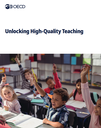This research, undertaken by JET Education Services, forms part of broader work being conducted by the Learning Generation Initiative (LGI) to help address the gaps in evidence on how a stronger middle tier can positively influence education outcomes, including teaching and learning. This research seeks to address the specific gaps outlined above by providing new evidence and insights from the South African education system. The research explored the challenges and innovations in middle-tier professional’s practices in education management and instructional leadership as well as the institutional factors that frame how the middle tier undertake these responsibilities. Contextual factors were explicitly investigated to better understand how they interact with institutional issues to impact middle-tier effectiveness.
A range of insights and best practices built up over Bridge Innovation in Learning's 14-year history, collated, and shared on the National Association of Social Change Entities in Education (NASCEE) website to support innovation and capacity building.
This report examines the value of alternative learning opportunities that lead to microcredentials, with a focus on youth, as a flexible and cost-effective way of acquiring skills and validating competencies to enhance signalling mechanisms among jobseekers and workers. It provides an analysis of the current global debate on microcredentials, including their benefits, challenges and potential impact on the labour market. Based on four illustrative cases — from a national system in India to sectoral use in health, private sector engagement by Microsoft and a platform-led approach through UNICEF’s Yoma — the report highlights the usage of microcredentials by governments, companies, international organisations and non-profit actors. The report offers policy recommendations aimed at improving the design, implementation and governance of microcredentials to better support youth transitions into decent work. This report is the culmination of a collective effort by the ILO and UNICEF, supported by the multi-stakeholder initiatives Decent Jobs for Youth and Generation Unlimited. The study benefited greatly from the experience and contributions of various governments, businesses, international organisations, and civil society organisations. JET's James Keevy, Kelly Shiohira, Patrick Molokwane, Lungelo Mthembu-Slater, Zaahedah Vally, Wamweni Shamambo, and Carla Pereira contributed to the report.
In an era defined by rapid innovation and constant change, it is tempting to focus on the latest trends or technologies that promise transformative change. However, refining existing teaching practices by closely examining the current realities of classrooms can be a powerful – and even potentially safer – approach to addressing stagnating student achievement, as seen across PISA participating countries. Further understanding the nature of teaching is critical, as no other factor within schools has a greater impact on students' academic success and overall achievement than the quality of teaching.
A response: Towards the Realisation of ECD in South Africa South Africa's ECD sector faces several significant challenges despite ongoing investments such as the DBE 2030 Strategy for ECD programmes and the Bana Pele ECD Registration Drive. Despite these efforts, high levels of child poverty are a pressing issue: As stated in the South African Early Childhood Review 2024, there are nearly 7 million children under the age of 6 years in South Africa, 70% of whom live below the poverty line, emphasising the need for affordable and accessible ECD services to support children’s development. An opinion piece by JET ECD Research Officer, Nkhensani Baloyi.







